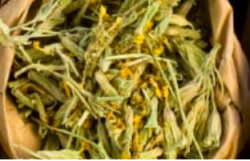Revamping process controls key to reliable ID procedures, American Botanicals CEO says

Stock, who bought into the business a couple of years ago, said lessons he learned in his previous career in supply chain management in the electrical components industry have been of great use as he maps the future for American Botanicals. It’s an effort to bring a business with a great history in the collection of wildcrafted materials into an era in which it necessary to be able to document where those botanicals came from and to prove the identity of those materials at multiple points in that chain.
Fur trading foundation
This is a potentially complex undertaking for a company like American Botanicals, which can trace its DNA lineage back to Wilcox, one of the foundational botanical sourcing companies in North America. The company, which is based in Eolia, MO, sources ingredients from thousands of wildcrafters working all over the continent. It’s a supply chain that Stock said is something of a legacy of how the business grew up.
“If you go back to the beginning, these guys came out of the fur trading business,” Stock said. The harvest of botanical materials was something for trappers to do while they ventured out to set trap lines and then doubled back to check them. In modern parlance it was an “added value” activity.
“This industry was very much built by traders. Somebody wanted something, you go find and you mark it up a little bit and you sell it,” Stock said.
The challenge was to reset the business from an emphasis of simply being able to get one’s hands on a given material at a given time to be able to prove in a GMP compliant fashion that it’s the right stuff. Just saying “I know goldenseal and that’s goldenseal,” is no longer good enough, Stock said, though he’s not disputing that fact that in the vast majority of cases that statement was true.
“These guys with 40 years experience, they know the material pretty well,” Stock said. But the game is changing rapidly, he said.
“I myself have been in this industry for just a short period of time and even I can feel the difference in the dynamics. The game was changing even as I started this acquisition in 2014. What happened with the New York Attorney General just accelerated it but I think the underlying dynamics were already there,” he said.
Lesson from the auto industry
On the American Botanicals website is a list of products that would fill a phone book, everything from acorns and agrimony to yucca root & herb. Stock said the 80/20 ratio on this list – in other words 80% of the sales come from 20% of the products – might come down to fewer than 50 main botanicals, but being able to prove identity on all of them is crucial. Stock approached the problem not from a standpoint of chemistry but from one of industrial process control.
“If you look at the automobile industry, they have the highest of standards I know of and they have really driven a lot of the changes in the way people think about quality. I used those lessons with Emerson Electric when I transformed some of their organizations,” Stock said.
“We are working on changing our receiving procedures and working that down into the collector base. You want to put your control points in as far into the process as you can,” he said.
Stock said the current emphasis on DNA testing is in his view somewhat premature. But he said that creating a more robust testing methodology is something that will be inevitable for the entire industry, and DNA might figure into that in the future as methods are refined and become more fit for purpose.
“I see some of our competitors resisting this, but I think for American Botanicals this could become a strategic strength. We are in an ideal position to do tests like microscopy to HPLC on incoming material because we get it in the whole state. Proving the ID of incoming raw material is becoming something of increasingly criticality across the entire industry,” Stock said.
Growing company
American Botanicals has been growing under Stock’s leadership with the help of capital from Advantage Capital Agribusiness Partners, LP. ACAP is a $154.5-million fund that is licensed by the US Department of Agriculture as a Rural Business Investment Company (RBIC). The fund is a partnership between Advantage Capital Partners and nine Farm Credit organizations. The most recent investment fueled the acquisition of Aloha Medicinals, the largest US producer of organic medicinal mushroom raw materials. Its products are used in various pharmaceutical and nutraceutical products, as well as in specialty food products and pet treats and supplements. Thirty percent of the company’s sales are international, with distribution in over 60 countries. Aloha also produces certified organic mushroom spawn, which is the seed stock used for cultivating edible mushrooms.














